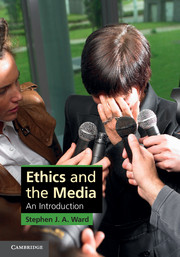5 - Media harm and offense
Published online by Cambridge University Press: 05 June 2012
Summary
The power of news media can be abused. Abuse leads to misinformation, erroneous judgments, and harmful consequences for individuals, groups, and countries. Therefore, ethics promotes the responsible use of media freedom and power. Responsible use means restraining the freedom to publish by considering the harm that stories and images may cause.
I assume that previous chapters have explained sufficiently why media have responsibilities. I now concern myself with what those responsibilities are, how they are expressed by restraining principles, and how the principles should operate in situations. In particular, I examine the restraining principles of avoiding harm and offense.
- Type
- Chapter
- Information
- Ethics and the MediaAn Introduction, pp. 161 - 206Publisher: Cambridge University PressPrint publication year: 2011

